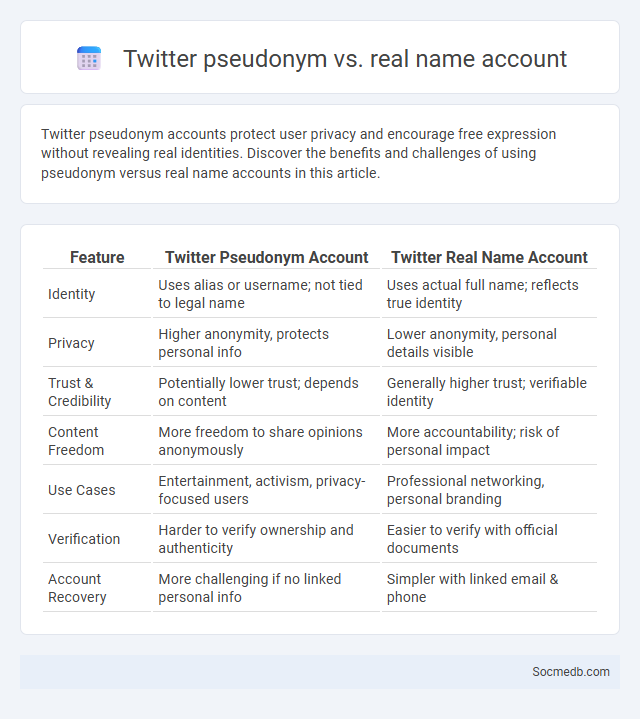
Photo illustration: Twitter pseudonym vs Real name account
Twitter pseudonym accounts protect user privacy and encourage free expression without revealing real identities. Discover the benefits and challenges of using pseudonym versus real name accounts in this article.
Table of Comparison
| Feature | Twitter Pseudonym Account | Twitter Real Name Account |
|---|---|---|
| Identity | Uses alias or username; not tied to legal name | Uses actual full name; reflects true identity |
| Privacy | Higher anonymity, protects personal info | Lower anonymity, personal details visible |
| Trust & Credibility | Potentially lower trust; depends on content | Generally higher trust; verifiable identity |
| Content Freedom | More freedom to share opinions anonymously | More accountability; risk of personal impact |
| Use Cases | Entertainment, activism, privacy-focused users | Professional networking, personal branding |
| Verification | Harder to verify ownership and authenticity | Easier to verify with official documents |
| Account Recovery | More challenging if no linked personal info | Simpler with linked email & phone |
Introduction: Understanding Twitter Account Types
Twitter offers various account types designed to meet different user needs, including personal, business, and creator accounts. Each type provides unique features optimized for engagement, analytics, and content promotion tailored to your goals. Understanding your ideal Twitter account type enhances your social media strategy and maximizes audience reach.
Defining Pseudonym Accounts on Twitter
Pseudonym accounts on Twitter are profiles created using fictitious names instead of real identities, often used to protect privacy or express opinions anonymously. These accounts can engage in various activities, including sharing information, participating in discussions, or building a separate online persona without revealing your true identity. Understanding the purpose and implications of pseudonym accounts helps you navigate Twitter's policies and community interactions effectively.
What Constitutes a Real Name Account?
A real name account on social media typically includes your legal name or the name recognized by official identification documents, ensuring authenticity and accountability. Platforms like Facebook and LinkedIn enforce real name policies to foster trust and reduce anonymity-related issues. Verifying your real name helps protect your identity, enhance security, and improve your overall social media experience.
Exploring the Concept of Alt Accounts
Alt accounts are alternative social media profiles created by users to maintain privacy, experiment with different content styles, or engage with communities without affecting their main account's reputation. These accounts can help You explore niche interests or share opinions anonymously while managing digital footprints effectively. Using alt accounts strategically enhances your online presence control and influences your social media interactions.
Privacy and Anonymity: What’s at Stake?
Your privacy on social media platforms is at constant risk due to data collection practices that track and store personal information. Anonymity is often compromised as algorithms and third-party apps link your online activities, exposing sensitive data to advertisers and potential cyber threats. Protecting your digital footprint requires vigilant management of privacy settings and awareness of the information you share.
Credibility and Trust: The Impact of Identity Choices
Choosing a consistent and authentic identity on social media significantly enhances your credibility and fosters trust among your audience. Profiles that accurately represent your true values and expertise encourage meaningful engagement and long-term loyalty. Maintaining transparency in identity choices helps differentiate you from misinformation and builds a reputable online presence.
Community Engagement: How Different Accounts Interact
Social media platforms facilitate diverse types of community engagement, where personal accounts typically build connections through authentic storytelling and direct interaction, while brand accounts focus on customer service and promotional content to drive loyalty. Influencer accounts leverage their authority and niche audience to foster trust and encourage active participation in conversations, often leading to higher engagement rates. Your interaction strategy should balance responsiveness and value-driven content to create a thriving, engaged community across multiple social media channels.
Security Risks: Comparing Account Types
Social media platforms present varied security risks depending on the account type, with personal accounts often targeted for identity theft and unauthorized access due to weaker privacy settings. Business and influencer accounts face increased threats from phishing schemes and credential stuffing attacks, exploiting high-value data and large follower bases. Securing all account types requires robust authentication methods, regular password updates, and vigilance against suspicious activities to mitigate these evolving cyber threats.
Twitter Policies: Rules Around User Identity
Twitter enforces strict policies regarding user identity to maintain authenticity and prevent deception. Users must not impersonate individuals, groups, or organizations in a misleading or manipulative manner. Verification badges and real-name requirements support transparency while allowing pseudonymous accounts under specific conditions.
Choosing the Right Account Type for Your Needs
Choosing the right social media account type is crucial for maximizing your online presence and engagement. Different platforms offer personal, professional, business, and creator accounts, each tailored to specific needs such as marketing, networking, or content sharing. Understanding your goals will help you select the account type that best aligns with your audience targeting and feature requirements, ensuring your social media strategy is effective.
 socmedb.com
socmedb.com